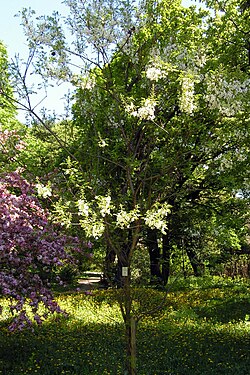Xanthoceras sorbifolium
| Habit | tree
| |
|---|---|---|
| Height: | ⇕ | 25 ft"ft" can not be assigned to a declared number type with value 25. |
| Width: | ⇔ | 10 ft"ft" can not be assigned to a declared number type with value 10. |
| Lifespan: | ⌛ | perennial |
| Origin: | ✈ | N China |
| Exposure: | ☼ | sun |
|---|---|---|
| Water: | ◍ | moderate |
| Features: | ✓ | flowers, fragrance |
| USDA Zones: | 6 to 9 | |
| Flower features: | ❀ | white |
Xanthoceras sorbifolium (Yellowhorn), the sole species in the genus Xanthoceras.
Read about Xanthoceras sorbifolium in the Standard Cyclopedia of Horticulture
|
|---|
|
Xanthoceras (Greek, xanthos, yellow, and keras, horn, alluding to the yellow horn-like processes of the disk). Sapindaceae. Ornamental shrub planted for its showy racemes of white flowers and also for the handsome pinnate foliage. Deciduous: lvs. alternate, odd-pinnate, with narrow serrate lfts.: fls. polygamous, the upper ones of the terminal raceme pistillate, the lower ones staminate, those of the lateral racemes staminate, with rarely a few pistillate ones at the apex; sepals and petals 5; disk with 4 sub-erect cylindric horns about half as long as stamens; stamens 8; ovary superior, 3-loculed, with a rather short, thick style: fr. a caps., with thick walls dehiscent into 3 valves, each locule with several globose, dark brown seeds.—One species from N. China, allied to Ungnadia and Koelreuteria. A very handsome shrub or sometimes a small tree with rather finely pinnate dark green and glossy foliage which is not attacked by insects and retains its bright color until frost sets in, and with showy white flowers appearing in upright profusely produced racemes with the leaves on last year's branches. The large greenish fruits are similar to those of the buckeye. It is hardy as far north as Massachusetts and is well suited for solitary planting on the lawn. Xanthoceras is also sometimes used for forcing. It is not very particular as to soil. A porous loamy soil and a sunny position seem to suit it best. Propagation is by seeds, stratified and sown in spring, and by root-cuttings, which succeed best with moderate bottom-heat.
|
Cultivation
This plant needs a long, hot growing season to flower well.
Propagation
- Do you have propagation info on this plant? Edit this section!
Pests and diseases
- Do you have pest and disease info on this plant? Edit this section!
Gallery
References
- Standard Cyclopedia of Horticulture, by L. H. Bailey, MacMillan Co., 1963
External links
- w:Xanthoceras sorbifolium. Some of the material on this page may be from Wikipedia, under the Creative Commons license.
- Xanthoceras sorbifolium QR Code (Size 50, 100, 200, 500)





